The foods you have to try while visiting Hamburg
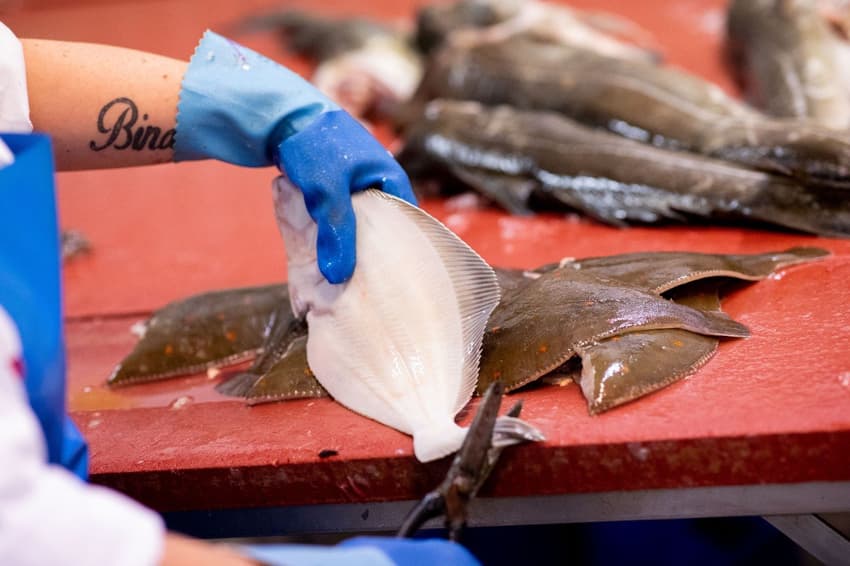
Every region of Germany has its own unique local cuisine - and Hamburg is no exception. The northern port city is known for its array of quirky fish dishes and a pastry delicacy with a slightly misleading name.
When it comes to Germany's major metropoles, Hamburg is a city like no other. Its location just a stone's throw from the North Sea coast made it a bustling trading hub way back in medieval times, and its sea-faring, mercantile history can still be felt in the air today.
When it comes to the dishes that Hamburg is known for, you'll discover that the city is equally unique. Instead of sausage and sauerkraut, your tastebuds will be tantalised by delectable seafood dishes, from tangy pickled herring to the fiery yet comforting kick of Pannfisch.
So if you're planning on visiting the Hanseatic city-state - or even if you live there - there are eight foods that you definitely shouldn't miss out on trying at least once.
1. Labskaus
This is admittedly one for the slightly more adventurous diners, but as Hamburg's 'national' dish, you shouldn't leave the city without sampling it. Labskaus is essentially a combination of canned or salted meat, potatoes and onion, served with sides of herring, gherkin, beetroot and fried egg - though whether fish should be added is the subject of heated debate.
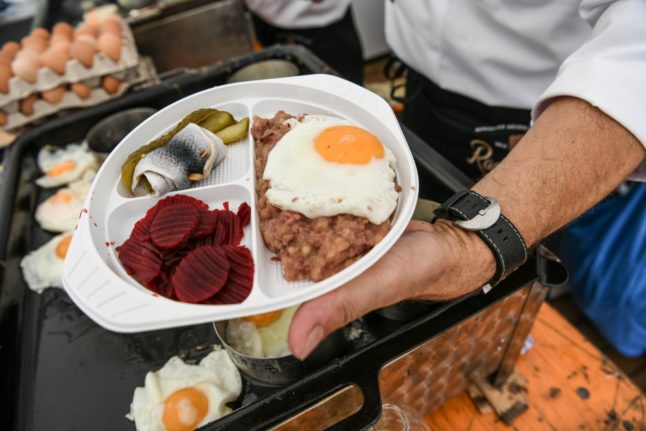
A cook presents a plate of Labskaus at a street food festival in northern Germany. Photo: picture alliance/dpa | Karsten Klama
This creative combination of ingredients was actually the invention of sailors back in the 16th century, who reached for things like pickled beetroot, salted meat and herring because they were easy to preserve on long voyages.
The name may also ring a few bells for Brits, as a dish of a similar name is eaten in the northern harbour town of Liverpool, where locals are also nicknamed "scousers" - presumably after the dish.
READ ALSO: 12 words and phrases you need to survive in Hamburg
2. Rundstück warm
If you've ever wondered why a hamburger is called a hamburger, the clue could lie in this hearty local snack. Originally eaten by dock workers, who needed something stodgy and comforting to get them through the long hours of manual labour, the Rundstück - or "round piece" - consists of a hefty slice of roast pork in a crusty wheat roll, with gravy poured on top.
This juicy bit of meat in a bun is thought to be the predecessor to the hamburger, which could well explain where the popular meat patty in a bun gets its name. Just like the hamburger, the Rundstück is traditionally eaten by hand as well, so dig in and don't worry about getting a little bit messy!
3. Fischbrötchen
If you're looking for a light lunch on the harbourside during your trip, there's nothing better - or more quintessentially Hamburg - than a fish roll.
If you think this sounds a bit dull, think again: Fischbrötchen can come in all shapes and sizes, whether its the cheekily named 'Bismarck' herring or melt-in-the-mouth North Sea crab.
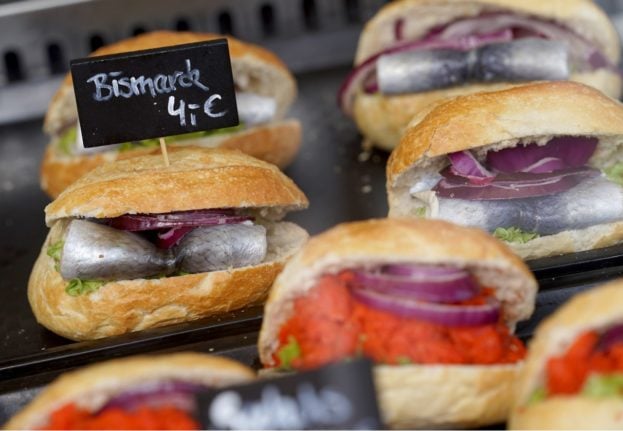
Bismarck herring fish rolls at a kiosk in Hamburg. Photo: picture alliance/dpa | Marcus Brandt
For a truly authentic experience, head to the harbour in the afternoon and pick up a fish roll to go from any of the little cafes or kiosks you stumble upon, then find a prime spot to enjoy it with the fresh sea air blowing in your face.
4. Finkenwerder Maischolle
In largely landlocked Germany, you shouldn't miss out on sampling deliciously fresh seafood when you come to the northern coast, and when in Hamburg Finkenwerde Maischolle should definitely be on your 'must try' list.
Scholle is German for plaice - a popular fish in northern Germany - and Finkenwerde is a district of Hamburg that was once a little fishing village. To prepare an authentic Finkenwerde Maischolle, the delicate, crumbly white fish is usually baked or pan fried with lashings of butter, then paired with bacon, onions and shrimp from the North Sea. Traditional sides also include Bratkartoffeln (roasted potatoes) and a zingy salad with plenty of crunchy lettuce. The perfect end to a day of sightseeing.
READ ALSO: Five German foods to try this summer
5. Aalsuppe
Though it may sound simple, Hamburg eel soup is actually a complex, flavourful dish with a rich - and disputed - history. The earliest recipe was discovered in a cookbook dating all the way back to 1788, and many believe the soup was simply a vehicle for using up leftovers. Some even claim that eel was never part of the original recipe, but was simply added to impress people who were visiting Hamburg.
These days, this wholesome sweet-and-sour dish consists of meat broth, dumplings, cured beef, eel, vegetables and even baked fruit. You'll find it on the menus of most traditional Hamburg restaurants as a main course.
6. Franzbrötchen
You'd be forgiven for assuming that Franzbrötchen - or French roll - comes from France, but this delectable pastry actually originated in Hamburg.
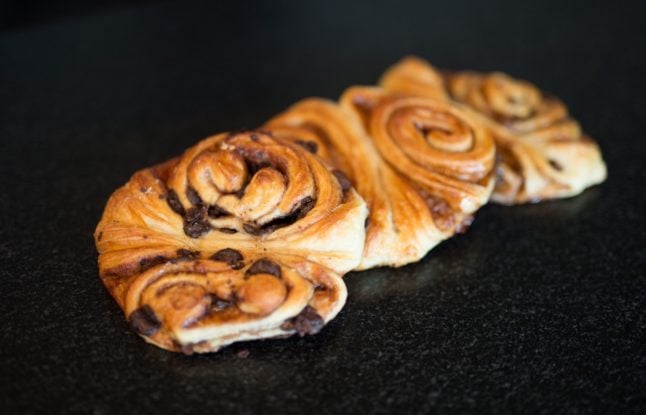
Franzbrötchen with raisins in a bakery in Hamburg. Photo: picture alliance/dpa | Daniel Reinhardt
That said, there's definitely a French influence in these sweet, buttery rolls: legend has it that locals were inspired by croissants during the Napoleonic occupation back in the 19th century and decided to invent their own version of the classic pastry.
Fast forward to today and you'll find Franzbrötchen in every bakery in the city, as well as in the surrounding towns. If you want the original, you should pick the version with a simple frosting of sugar and cinnamon, but you can also choose from numerous adaptations with fillings like marzipan and chocolate.
7. Pannfisch
If you're looking for a rustic fish dish with a little bit of heat to it, Pannfisch could be exactly what you're looking for. Like a lot of Hamburg's regional cuisine, it was once considered a poor man's meal, but these days you'll find it expertly cooked in a number of local eateries.
The concept is pretty simple: a fillet of fish is coated in a hefty helping of flour to create a light batter, and then fried and served in a buttery mustard sauce along with a generous helping of Bratkartoffeln. In original versions of the dish, the sauce was to mask the slightly funky flavour of the random assortment of fish pieces used to make the dish, but nowadays restaurants will elevate the traditional meal with much finer varieties of white fish, which are usually caught fresh from the North Sea.
8. Pechkekse
Northern Germans are known for their dark sense of humour, and there's no better example of this than the invention of Pechkeske, or bad-fortune cookies, which were invented in Hamburg and are still manufactured there today.
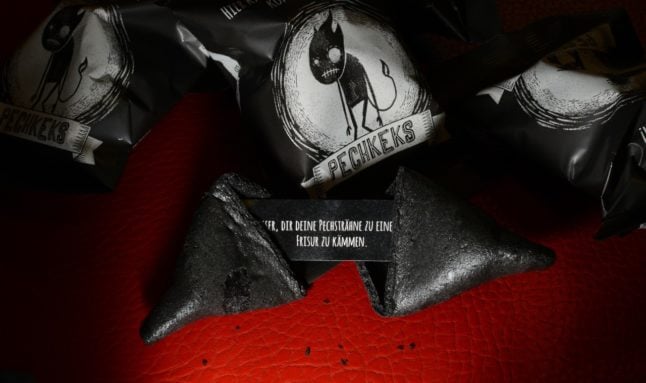
Pechkekse - or bad fortune cookies - predicting bad luck. Photo: picture alliance / dpa | Franziska Kraufmann
This is a crunchy treat that tastes an awful lot like a fortune cookie, but in a striking black colour to match the black humour inside. Instead of cryptic predictions about fame, fortune and true love, you may find the cookie insulting you with a phrase like: "You're kind of funny, but not in a funny way."
Open a few Pechkekse right at the start of the trip and you'll be well prepared for that gruff northern banter.
READ ALSO: Thrifty Swabians and haughty Hamburgers: A guide to Germany's regional stereotypes
9. Rote Grütze
Visiting Hamburg in the summer months? Then you can't leave without trying Rote Grütze, a delightfully refreshing fruit dessert that's hugely popular in northern Germany.
An assortment of berries - including strawberries, currents and cherries - are cooked in sugar to produce a sharp, citrussy compote that's generally served with whipped cream, ice cream, cold milk or vanilla sauce.
Pair with a glass of sparkling prosecco at the end of an al fresco meal on the waterfront and we guarantee you'll be in heaven.
Comments
See Also
When it comes to Germany's major metropoles, Hamburg is a city like no other. Its location just a stone's throw from the North Sea coast made it a bustling trading hub way back in medieval times, and its sea-faring, mercantile history can still be felt in the air today.
When it comes to the dishes that Hamburg is known for, you'll discover that the city is equally unique. Instead of sausage and sauerkraut, your tastebuds will be tantalised by delectable seafood dishes, from tangy pickled herring to the fiery yet comforting kick of Pannfisch.
So if you're planning on visiting the Hanseatic city-state - or even if you live there - there are eight foods that you definitely shouldn't miss out on trying at least once.
1. Labskaus
This is admittedly one for the slightly more adventurous diners, but as Hamburg's 'national' dish, you shouldn't leave the city without sampling it. Labskaus is essentially a combination of canned or salted meat, potatoes and onion, served with sides of herring, gherkin, beetroot and fried egg - though whether fish should be added is the subject of heated debate.

This creative combination of ingredients was actually the invention of sailors back in the 16th century, who reached for things like pickled beetroot, salted meat and herring because they were easy to preserve on long voyages.
The name may also ring a few bells for Brits, as a dish of a similar name is eaten in the northern harbour town of Liverpool, where locals are also nicknamed "scousers" - presumably after the dish.
READ ALSO: 12 words and phrases you need to survive in Hamburg
2. Rundstück warm
If you've ever wondered why a hamburger is called a hamburger, the clue could lie in this hearty local snack. Originally eaten by dock workers, who needed something stodgy and comforting to get them through the long hours of manual labour, the Rundstück - or "round piece" - consists of a hefty slice of roast pork in a crusty wheat roll, with gravy poured on top.
This juicy bit of meat in a bun is thought to be the predecessor to the hamburger, which could well explain where the popular meat patty in a bun gets its name. Just like the hamburger, the Rundstück is traditionally eaten by hand as well, so dig in and don't worry about getting a little bit messy!
3. Fischbrötchen
If you're looking for a light lunch on the harbourside during your trip, there's nothing better - or more quintessentially Hamburg - than a fish roll.
If you think this sounds a bit dull, think again: Fischbrötchen can come in all shapes and sizes, whether its the cheekily named 'Bismarck' herring or melt-in-the-mouth North Sea crab.

For a truly authentic experience, head to the harbour in the afternoon and pick up a fish roll to go from any of the little cafes or kiosks you stumble upon, then find a prime spot to enjoy it with the fresh sea air blowing in your face.
4. Finkenwerder Maischolle
In largely landlocked Germany, you shouldn't miss out on sampling deliciously fresh seafood when you come to the northern coast, and when in Hamburg Finkenwerde Maischolle should definitely be on your 'must try' list.
Scholle is German for plaice - a popular fish in northern Germany - and Finkenwerde is a district of Hamburg that was once a little fishing village. To prepare an authentic Finkenwerde Maischolle, the delicate, crumbly white fish is usually baked or pan fried with lashings of butter, then paired with bacon, onions and shrimp from the North Sea. Traditional sides also include Bratkartoffeln (roasted potatoes) and a zingy salad with plenty of crunchy lettuce. The perfect end to a day of sightseeing.
READ ALSO: Five German foods to try this summer
5. Aalsuppe
Though it may sound simple, Hamburg eel soup is actually a complex, flavourful dish with a rich - and disputed - history. The earliest recipe was discovered in a cookbook dating all the way back to 1788, and many believe the soup was simply a vehicle for using up leftovers. Some even claim that eel was never part of the original recipe, but was simply added to impress people who were visiting Hamburg.
These days, this wholesome sweet-and-sour dish consists of meat broth, dumplings, cured beef, eel, vegetables and even baked fruit. You'll find it on the menus of most traditional Hamburg restaurants as a main course.
6. Franzbrötchen
You'd be forgiven for assuming that Franzbrötchen - or French roll - comes from France, but this delectable pastry actually originated in Hamburg.

That said, there's definitely a French influence in these sweet, buttery rolls: legend has it that locals were inspired by croissants during the Napoleonic occupation back in the 19th century and decided to invent their own version of the classic pastry.
Fast forward to today and you'll find Franzbrötchen in every bakery in the city, as well as in the surrounding towns. If you want the original, you should pick the version with a simple frosting of sugar and cinnamon, but you can also choose from numerous adaptations with fillings like marzipan and chocolate.
7. Pannfisch
If you're looking for a rustic fish dish with a little bit of heat to it, Pannfisch could be exactly what you're looking for. Like a lot of Hamburg's regional cuisine, it was once considered a poor man's meal, but these days you'll find it expertly cooked in a number of local eateries.
The concept is pretty simple: a fillet of fish is coated in a hefty helping of flour to create a light batter, and then fried and served in a buttery mustard sauce along with a generous helping of Bratkartoffeln. In original versions of the dish, the sauce was to mask the slightly funky flavour of the random assortment of fish pieces used to make the dish, but nowadays restaurants will elevate the traditional meal with much finer varieties of white fish, which are usually caught fresh from the North Sea.
8. Pechkekse
Northern Germans are known for their dark sense of humour, and there's no better example of this than the invention of Pechkeske, or bad-fortune cookies, which were invented in Hamburg and are still manufactured there today.

This is a crunchy treat that tastes an awful lot like a fortune cookie, but in a striking black colour to match the black humour inside. Instead of cryptic predictions about fame, fortune and true love, you may find the cookie insulting you with a phrase like: "You're kind of funny, but not in a funny way."
Open a few Pechkekse right at the start of the trip and you'll be well prepared for that gruff northern banter.
READ ALSO: Thrifty Swabians and haughty Hamburgers: A guide to Germany's regional stereotypes
9. Rote Grütze
Visiting Hamburg in the summer months? Then you can't leave without trying Rote Grütze, a delightfully refreshing fruit dessert that's hugely popular in northern Germany.
An assortment of berries - including strawberries, currents and cherries - are cooked in sugar to produce a sharp, citrussy compote that's generally served with whipped cream, ice cream, cold milk or vanilla sauce.
Pair with a glass of sparkling prosecco at the end of an al fresco meal on the waterfront and we guarantee you'll be in heaven.
Join the conversation in our comments section below. Share your own views and experience and if you have a question or suggestion for our journalists then email us at [email protected].
Please keep comments civil, constructive and on topic – and make sure to read our terms of use before getting involved.
Please log in here to leave a comment.